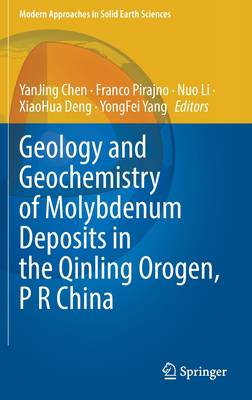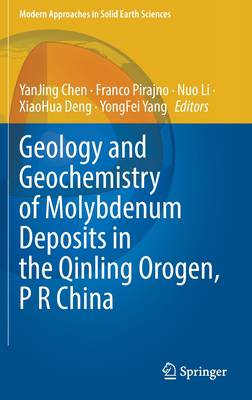
- Afhalen na 1 uur in een winkel met voorraad
- Gratis thuislevering in België vanaf € 30
- Ruim aanbod met 7 miljoen producten
- Afhalen na 1 uur in een winkel met voorraad
- Gratis thuislevering in België vanaf € 30
- Ruim aanbod met 7 miljoen producten
Geology and Geochemistry of Molybdenum Deposits in the Qinling Orogen, P R China
Omschrijving
This book is the first systematic treatise of available data and view-points obtained from geological and geochemical studies of the Mo deposits in Qinling Orogen, China. Qinling Orogen has a minimum reserve of 8.7 Mt Mo, ranking the largest molybdenum province both in China and the world. Incorporating all known Mo deposit types in the world, it presents extensive studies of Mo deposits of world-class and unusual types within tectonic settings. The Qinling Orogen was finally formed during continental collision between Yangtze and North China cratons, following the Triassic closure of the northernmost paleo-Tethys. It hosts 49 Mo deposits formed in seven mineralization events since 1850 Ma, with all the world-class deposits being formed during 160-105 Ma, coeval with collisional orogeny. These deposits are assigned to magmatic and metamorphic hydrothermal classes. The magmatic hydrothermal class includes porphyries, skarns, and intrusion-related veins (carbonatite, fluorite and quartz). The porphyry Mo systems in Qinling Orogen are predominated by Dabie-type formed in continental collision setting, followed by Endako- and Climax-types formed in continental arcs and rifts, respectively. The metamorphic hydrothermal Mo deposits are only reported in Qinling Orogen, and thus a new crustal continuum model for the orogenic class mineral systems is proposed. A scientific linkage between ore geology and fluid inclusions is introduced and verified both by theory and case studies. This is the first research book comprehensively displaying continental collision metallogeny. This literature will benefit both Western and Chinese mineral explorers and miners, as well as research scientists and students.
Specificaties
Betrokkenen
- Uitgeverij:
Inhoud
- Aantal bladzijden:
- 842
- Taal:
- Engels
- Reeks:
- Reeksnummer:
- nr. 22
Eigenschappen
- Productcode (EAN):
- 9789811648694
- Verschijningsdatum:
- 22/12/2021
- Uitvoering:
- Hardcover
- Formaat:
- Genaaid
- Afmetingen:
- 156 mm x 234 mm
- Gewicht:
- 1369 g

Alleen bij Standaard Boekhandel
Beoordelingen
We publiceren alleen reviews die voldoen aan de voorwaarden voor reviews. Bekijk onze voorwaarden voor reviews.










